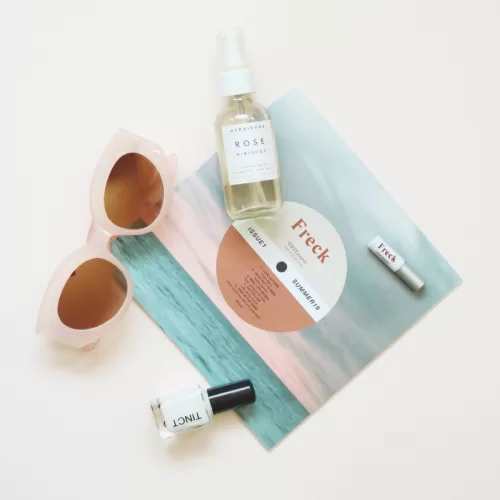As the weather shifts, our skin experiences transformations too. Adapting our skincare regimen to accommodate these changing conditions becomes essential to sustain glowing skin year-round. Understanding how to build a skincare routine tailored to varying climates, whether protecting against winter dryness or addressing summer’s impact on the skin, is crucial. Recognizing the significance of skincare helps answer questions like, “What should my skincare routine be?” and guides us in maintaining radiant skin regardless of the weather.

Recognizing how seasonal changes impact our skin
Our skin is constantly. Adjusting to factors such, as temperature, humidity and exposure to the sun. These factors can have an impact on the health and appearance of our skin. For instance during months the lack of moisture in the air can lead to dryness and dehydration in our skin. To address this issue it is important to use moisturizers and hydrating serums that not replenish lost moisture but also protect our skin barrier. On the hand during hot summer weather increased oil production and clogged pores are concerns that require lightweight products, with oil controlling properties.
Additionally seasonal changes can also affect skin care issues such as acne breakouts, sensitivity levels and hyperpigmentation. By adjusting your skin care routine, you can effectively address these concerns. Promote overall skin health and appearance.
The significance of adjusting your skincare regimen
It is crucial to adapt your skincare routine according to the changing seasons, for reasons. Firstly, it allows you to give your skin the care it requires based on conditions. Just like our bodies need nourishment throughout the year our skin also needs ingredients and formulations to maintain its health and radiance.
Secondly, making changes in your skincare routine can help prevent and address skin problems that arise due to environmental factors. For instance, using a moisturizer in the summer can prevent oiliness and breakouts. Similarly incorporating a moisturizer during winter can combat dryness effectively.
Lastly, adapting your skincare routine to match the seasons ensures effectiveness of the products you use. Certain ingredients may work better under weather conditions. For example, hyaluronic acid, known for its hydrating properties is particularly beneficial during months when dryness is more prevalent. By aligning your skincare routine with the seasons, you can optimize product efficacy.
Sunscreen should be applied as the last step in your skincare routine, after moisturizer and before makeup (if you use any). Ideally, it should be applied every morning, regardless of the weather, as UV rays can still penetrate through clouds. If you’re outdoors, reapplication every two hours is recommended, or more frequently if swimming or sweating.
Winter skincare tips
During winter, cold air and low humidity levels can harm our skin by causing dryness, flakiness or even irritation.
To keep your skin protected and hydrated during this season here are some tips, for winter skincare:
1. Moisturize; Choose a more nourishing moisturizer to lock in moisture and create a barrier on your skin. Look for ingredients like ceramides and hyaluronic acid that help retain moisture.
2. Hydrating serums; Add a hydrating serum to your skincare routine for a boost of moisture. Look for serums that contain ingredients such as glycerin, aloe vera or vitamin E.
3. Exfoliation; It’s important to exfoliate during the winter to remove dead skin cells and allow better absorption of moisturizing products. Opt for exfoliants like acid or enzymes to avoid stripping away natural oils.
4. Sunscreen; Don’t forget to apply sunscreen in the winter months. UV rays can still harm your skin especially when reflected off snow. Choose a spectrum sunscreen with a SPF 30.
5. Lip care; Keep your lips from getting chapped or cracked by using a nourishing lip balm throughout the day. Look for balms that contain ingredients such as shea butter or beeswax.
Remember consistency is crucial when it comes to skincare routines. Stick to your regimen. Adjust, as necessary to maintain radiant skin throughout the winter season.
Spring skincare tips
As the weather starts to warm up and the days become longer it’s time to update our skincare routine and prepare for the spring season. Here are some tips to help you transition from winter to spring with your skincare:
- Lighten things up; Switching to moisturizers and serums is an idea, as the weather changes. Look for hydrating formulas that still allow your skin to breathe.
- Prioritize SPF protection; With the sun getting stronger it’s important to increase your sun protection game. Make sure you use a spectrum sunscreen with at SPF 30 and remember to reapply every two hours especially if you spend a lot of time outside.
- Embrace antioxidants; Consider incorporating products that contain antioxidants like vitamin C or green tea extract into your routine. These ingredients can help shield your skin from radicals and environmental damage.
- Exfoliate Spring is an ideal time to shed dead skin cells and reveal a fresh complexion. You can try using a chemical exfoliant or a gentle scrub for more even toned skin.
- Be mindful of allergies; Spring often brings seasonal allergies that can cause skin irritation and inflammation. To prevent reactions, avoid products with irritants like fragrances or harsh preservatives.
These tips will assist you in updating your skincare routine for spring ensuring radiant looking skin as you embrace the change, in season.
To ensure your skin remains healthy, protected, and radiant during the spring season it’s important to adapt your skincare routine.
Summer skincare tips
As summer draws near the increase in humidity and temperatures can have effects on our skin. These changes might lead to pores due, to increased oil production and heightened sensitivity. Here are some useful suggestions to keep your skin fresh and protected during the summer season;
1. Choose products that’re light and oil free to avoid clogging your pores. Consider using moisturizers and serums with gel or water based formulas that give your skin hydration without feeling heavy.
2. Control oiliness; Include skincare products containing ingredients like acid or witch hazel to control oil production. These components help regulate sebum levels and maintain a shiny complexion.
3. Prioritize sun protection; Sunscreen is vital during the summer season. Choose a greasy sunscreen with a minimum SPF 30 rating. Remember to reapply every two hours especially if you’re swimming or perspiring.
4. Refresh with cooling mists; Keep a mist throughout the day for instant refreshment. Seek mists enriched with soothing ingredients, like aloe vera or cucumber extract that provide a sensation while calming the skin.
By adjusting your skincare routine based on these recommendations you can enjoy healthy and glowing skin despite the changing weather conditions of springtime.
Staying hydrated is essential for maintaining skin. Make sure to drink plenty of water throughout the day to keep your skin hydrated from within.
When it comes to summer skincare it’s important to protect your skin from the sun rays and maintain its balance and health throughout the season.
Fall skincare tips
As the colors change and temperatures drop in fall our skin has needs. The air becomes drier, which can cause increased dryness and sensitivity. Here are some tips to adjust your skincare routine for autumn:
- Keep your skin hydrated; Invest in a moisturizer that hydrates your skin and helps combat dryness caused by changing weather. Look for ingredients like acid or ceramides that retain moisture and strengthen the skin barrier.
- Repair and nourish your skin; Use serums or face oils with ingredients like rosehip oil or niacinamide to repair and nourish your skin. These components promote regeneration of skin cells. Strengthen its barrier.
- Gently exfoliate; Exfoliation is still important during fall as it removes skin cells and promotes cell turnover. However, opt for exfoliants to avoid drying or irritating your skin.
- Antioxidant rich options: To safeguard your skin against harm, from the environment it’s beneficial to incorporate antioxidants into your skincare routine. Look for ingredients like vitamin E, green tea extract or resveratrol.
- Taking care of your lips; As the air gets drier our lips tend to become dry and chapped. To keep them moisturized and shielded use a nourishing lip balm containing ingredients such as shea butter or coconut oil.
By adjusting your skincare regimen based on the changing demands of the autumn season you can ensure that your skin remains healthy, well-nourished and adequately protected.
How to determine your skin type and choose products for each season
Understanding your skin type is crucial in establishing a skincare routine tailored to meet your individual needs. Different skin types have requirements that may vary with each season. Here’s a guide to help you identify your skin type and select products for every time of the year:
Normal skin
Normal skin is well balanced. Generally, doesn’t experience excessive dryness or oiliness. You might occasionally encounter breakouts or dry patches; however overall, your complexion remains relatively consistent. Opt for hydrating products that maintain the equilibrium of your skin all year round.
Dry skin
Dry skin often feels tight rough. May appear flaky or lackluster. The air tends to lose its moisture during the winter months making the skin drier. To keep your skin hydrated and nourished choose skincare products that’re rich in emollients and humectants. In months opt for moisturizers while in warmer months switch to lighter formulations.
Oily skin
If you have oily skin, you may notice it gets shinier or greasier during the summer. Look for lightweight and oil free products that can help control oil production and minimize the appearance of pores. During winter it’s best to use a moisturizer to avoid clogging your pores.
Combination skin
Combination skin is characterized by a T zone (forehead, nose and chin) and drier cheeks. Customize your skincare routine to cater to the needs of each area. Use oil free products on your T zone while opting for hydrating products on your cheeks. Adjust your routine based on concerns well.
Sensitive skin
Sensitive skin is easily irritated. Can react negatively to ingredients or environmental factors. It’s important to choose fragrance free products specifically designed for skin. Avoid exfoliants or aggressive treatments that may cause redness or inflammation.
Remember, it’s important to assess your skin’s needs as they may change over time, during seasons. Adjusting your skincare routine accordingly is essential.
DIY skincare remedies for seasonal skin concerns
If you prefer an approach to skincare or want to enhance your existing routine there are several do it yourself remedies available to address specific seasonal skin concerns. These remedies utilize household ingredients that’re both gentle and effective. Here are a few suggestions for DIY skincare remedies aimed at tackling seasonal skin issues:
Dry skin
You can create a nourishing face mask by combining mashed avocado, honey and a few drops of olive oil. Apply the mixture onto your face. Let it sit for 15 20 minutes before rinsing off with warm water. Avocado offers fatty acids honey acts as a humectant while olive oil moisturizes and nourishes the skin.
Oily skin
Consider using a clay mask by mixing bentonite clay with apple cider vinegar and adding a few drops of tea tree oil. Apply the mask onto your face, allow it to dry completely then rinse off with water. Bentonite clay helps absorb oil apple cider vinegar helps balance the pH of the skin while tea tree oil possesses properties.
Dull skin
Make a home made skin scrub by combining ground coffee, sugar and coconut oil. Apply the scrub to your face using gentle motions, then rinse it off with water. The coffee acts as a natural exfoliant, while the sugar helps remove dead skin cells. Additionally, the coconut oil helps hydrate and nourish your skin.
Acne-prone skin
Make a spot treatment by combining tea tree oil with a carrier oil, like jojoba or grapeseed oil. Apply an amount to blemishes or areas to acne before going to bed. Tea tree oil has properties that can reduce inflammation and fight bacteria that cause acne.
Making your own skincare remedies can be a budget friendly way to deal with skin problems that arise during different seasons. Just remember to do a patch test on the ingredients first and if you notice any adverse reactions, stop using them immediately. And, of course, if you have ongoing skin issues, it’s always wise to seek advice from a dermatologist.
The significance of nutrition in maintaining skin throughout the year
Taking care of your skin isn’t just about external products; it also involves nourishing your body from within. Adequate nutrition plays a role in keeping your skin healthy all year.
Here are some important nutrients and foods that can do wonders for your skin
Omega 3 fatty acids
You can find omega 3 acids, in fish like salmon, mackerel and sardines as well as chia seeds and walnuts. These healthy fats help maintain the elasticity of your skin reduce inflammation and promote skin health.
Vitamin C
Citrus fruits, strawberries, bell peppers and leafy greens are sources of vitamin C. This vitamin plays a role in collagen production – a protein that keeps your skin firm and youthful. Additionally, it acts as an antioxidant by shielding your skin from radicals.
Usually, people incorporate Vitamin C into their morning skincare regimen. Its purpose is to shield the skin from harm caused by free radicals that stem from environmental elements such as UV exposure and pollution. Applying a vitamin C serum prior to using sunscreen can enhance the skin’s ability to safeguard itself against the sun’s rays and provide overall protection. Nevertheless, it is crucial to adhere to the instructions provided by the specific product you are using, as formulations and concentrations may vary.
Vitamin E
Nuts, seeds, avocados and spinach are packed with vitamin E. This nutrient offers protection against damage caused by UV rays and environmental pollutants. It also helps maintain skin elasticity while preventing aging.
Antioxidants
Berries, dark chocolate, green tea and colorful fruits and vegetables contain antioxidants that combat radicals. They also reduce inflammation. Contribute to complexion.
Water
Staying hydrated is essential, for maintaining skin. By drinking an amount of water each day, you can flush out toxins from your system while keeping your skin moisturized – improving the health of your skin.
By adding a well rounded diet that includes these essential nutrients, you can enhance your skincare regimen and work towards achieving a more vibrant and healthy looking complexion.






